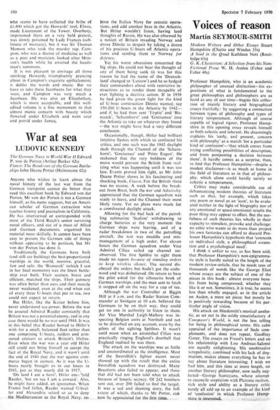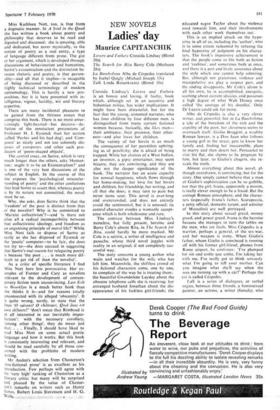Voices of reason
Martin SEYMOUR-SMITH
Modern Writers and Other Essays Stuart Hampshire (Chatto and Windus 35s) A Soul in the Quad Kathleen Nott (Rout- ledge 63s) G.K.Chesterton: A Selection from his Non- Fictional Prose W. IL Auden (Faber and Faber 40s) Professor Hampshire, who is an academic philosopher of unusual distinction—his ex- positions of what is fundamental to the great philosophies and philosophers are as lucid as any of our time—begins this collec- tion of mainly literary and biographical essays fruitfully: by suggesting a connection between types of philosophy and types of literary temperament. Although of course capable of logical rigour, Professor Hamp- shire in this opening essay reveals himself as both eclectic and tolerant. He disarmingly explains his 'early, and present, concern with philosophy' as a search 'for a particular kind of confusion'—`that which comes from trying conflicting possibilities of description, and from postponing a decision between them'. It hardly comes as a surprise, then, to find that Professor Hampshire—despite a modest disclaimer—is as much at home in the field of literature as in that of philoso- phy, which alone could hardly satisfy so eclectic a temperament.
Critics may make considerable use of dehumanising modern theories of literature such as that, for example, which takes any poem or novel as an 'icon', to be evalu- ated neither in the light of biography nor of any emotional or quasi-emotional results the poor thing may appear to effect. But the use- fulness of such theories lies wholly in their capacity to stimulate, provoke and challenge: no critic who wants to do more than project his own fantasies can afford to discard Pro- fessor Hampshire's hypothesis that 'connects an individual style, a philosophical assum- tion and a psychological need'.
I think it unfair to say, as has been said, that Professor Hampshire's non-epigramma- tic style is hardly suited to the length of the modern review-article, that he needs tens of thousands of words like the George Eliot whose essays are the subject of one of the pieces in this book: almost everyone bene- fits from being compressed, whether they like it or not. Sometimes, it is true, he seems less than wholly engaged, as in the article on Auden, a mere set piece; but mostly he is positively rewarding because of his par- ticular angle of vision.
His attack on Hindemith's musical aesthe- tic, as set out in the oddly unsatisfactory A Composer's World, is not the less telling for being in philosophical terms. His calm appraisal of the importance of Sade com- plements, and does not repeat, Geoffrey Gorer. The essays on Freud's letters and on his relationship with Lou Andreas-Salome are equally enlightening. His unobtrusive scrupulosity, combined with his lack of dog- matism, makes almost everything he has to say about literature interesting; I wish we had him, and this time at more length, on another literary philosopher, now sadly neg- lected—George Santayana, whose attempt to reconcile scepticism with Platonic realism, rich style and ability as a literary critic surely all add up to an example of the kind of 'confusion' in which Professor Hamp- shire is interested, Miss Kathleen Nott, too, is free from a dogmatic manner. In A Soul in the Quad she has written a book about poetry and philosophy that deserves to be read and digested and discussed: she is amusing, able and dedicated, but never mystically, to the notion of poetry as a real entity, a type of language different from prose. The gist or her argument, which is developed through discussions of behaviourism and humanism, Sartre's existentialism and the distinction be- tween rhetoric and poetry, is that person- ality—and all that it implies—is incapable of being discussed or described in the highly technical terminology of modern epistemology. This is hardly a new pro- position, but it is here presented with in- telligence, vigour, lucidity, wit and literary expertise.
There are many incidental pleasures to be gained from the thirteen essays that comprise this book. There is no more enter- tainingly light-hearted—but decisive—de- flation of the omniscient pretensions of Professor H. J. Eysenck than her section called 'Pavlov and his bad dog'; and 'Corn- poets' as nicely and not too solemnly dis- poses of computers and other such pro- ducers of 'poem-shaped objects'.
The central essay, on Sartre, which is very much longer than the others, asks 'Human- ism: ought it to be an Existentialism?' and is one of the very best discussions of the subject in English. In the course of this she exposes the 'psychological misunder- standing of poetry' and the other confusions that lead Sartre to assert that, whereas poetry is by its nature not committed, the novel must be so.
Why, she asks, does Sartre think that the 'freedom' of the poet is distinct from that of the novelist? Why is he committed to 'Marxist collectivism'?—and 'is there not after all a radical incompatibility between that collectivistic ideology, and freedom as an organising principle of moral life?' While Miss Nott fails to dispose of Sartre as easily as she has disposed of Eysenck or the 'poetic' computer—to be fair, she does not try to—she does succeed in suggesting that Sartre's real reason for relegating poetry is because 'the poet . . . is much more dif- ficult to get rid of than the novelist'.
As a critic of specific literature I find Miss Nott here less provocative. Her ex- amples of Forster and Cary as novelists relevant to the development of contem- porary fiction -seem unconvincing. Last Exit to Brooklyn is a much better book than she thinks it is—and for reasons totally unconnected with its alleged 'obscenity'. It is quite wrong, surely, to state that the lines '0 saisons! 0 châteaux, Quel lime est sans defauts?"don't mean that Rimbaud is at all interested in our inevitable imper- fection': with the necessary corollary, `among other things', they do mean just that. , . . Finally, I should have liked to read Miss Nott on some actual poetic language and how it works. But this book is consistently interesting and relevant, and should be read carefully by all those con- cerned with the problems of modern writing.
Mr Auden's selection from Chesterton's `non-fictional prose' is as excellent as his introduction. Few perhaps will agree with his 'very high' ranking of Chesterton as a literary critic; but many will be surprised and pleased by the value of Chester4 ton's remarks on writers such as Henry James, Robert Louis Stevenson and H. G,
- - •



































 Previous page
Previous page